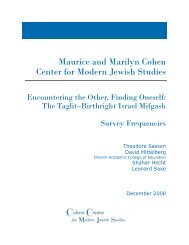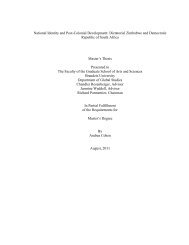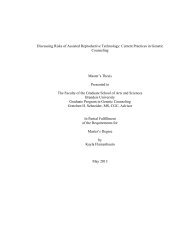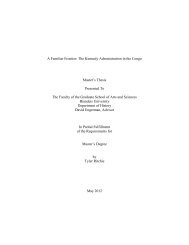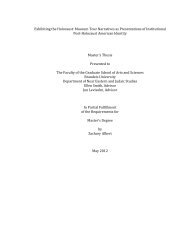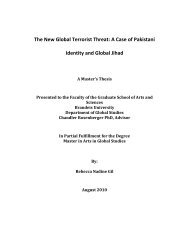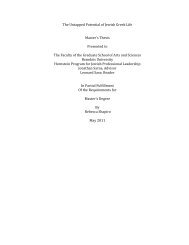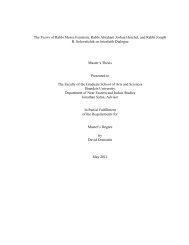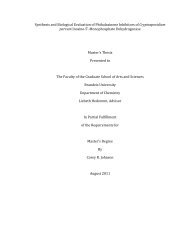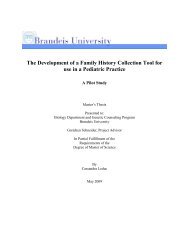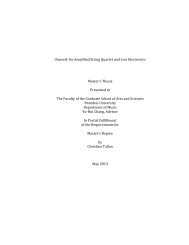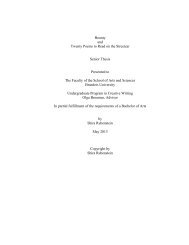Ezra Taft Benson and the State of Israel - Brandeis Institutional ...
Ezra Taft Benson and the State of Israel - Brandeis Institutional ...
Ezra Taft Benson and the State of Israel - Brandeis Institutional ...
- No tags were found...
You also want an ePaper? Increase the reach of your titles
YUMPU automatically turns print PDFs into web optimized ePapers that Google loves.
<strong>the</strong> Messiah. Indeed, both <strong>Benson</strong> <strong>and</strong> Woodruff seem to acknowledge that this will nothappen until after <strong>the</strong> ga<strong>the</strong>ring prophecy is fulfilled. This is not to imply that <strong>Benson</strong>, orMormons in general, had no intention <strong>of</strong> sharing his unique Christian faith with hisJewish bro<strong>the</strong>rs. Quite <strong>the</strong> contrary. He ends his message to <strong>the</strong> members <strong>of</strong> <strong>the</strong> LDSfaith in 1950 with an assurance that Christ will appear to <strong>the</strong> Jews at <strong>the</strong> Mount <strong>of</strong> Olives,during <strong>the</strong>ir “last great struggle,” <strong>and</strong> fight <strong>the</strong>ir battle for <strong>the</strong>m, 107 <strong>and</strong> at that moment<strong>the</strong>y “shall know that [He] is <strong>the</strong> Lord.” 108 Likewise, in his message to <strong>the</strong> Jews in 1976,<strong>Benson</strong> ends with a testimony that Joseph Smith was a true prophet <strong>of</strong> God, <strong>and</strong> urges“all to give heed to <strong>the</strong> message given by God through him.” 109 Thus while reaching outto Jews in bro<strong>the</strong>rhood, <strong>and</strong> espousing views common to many Christians, he also shareshis own underst<strong>and</strong>ing <strong>of</strong> <strong>the</strong> sense <strong>of</strong> fulfillment <strong>of</strong> prophecy relating to <strong>the</strong> Jews <strong>and</strong><strong>the</strong>ir homel<strong>and</strong>. The difference is that <strong>Benson</strong>'s support <strong>of</strong> <strong>Israel</strong> <strong>and</strong> <strong>the</strong> Jewish people isnot influenced by <strong>the</strong>ir acceptance or rejection <strong>of</strong> Jesus Christ.Ano<strong>the</strong>r aspect that contrasts with <strong>Benson</strong>'s perspective was <strong>the</strong> guilt manyChristians felt at <strong>the</strong> horror <strong>of</strong> <strong>the</strong> Holocaust. While <strong>Benson</strong> felt keenly <strong>and</strong> personally itsdevastation, a point which he raises in all three <strong>of</strong> <strong>the</strong> talks discussed, <strong>and</strong> which appearsin various o<strong>the</strong>r political documents, he clearly does not share in <strong>the</strong> guilt for itsoccurrence. Indeed, he remains distinctly separate from it. His biographer, Sheri Dew,notes that upon visiting <strong>the</strong> crematorium in Dachau in 1946, he wrote in his journal: “Thescenes <strong>and</strong> statistics given made us shudder to realize how far men will go in evil <strong>and</strong> sin107108109Zechariah 14:1-21.<strong>Benson</strong>, “Jews Return to Palestine,” 5; see also Doctrine <strong>and</strong> Covenants 45:53.<strong>Benson</strong>, “Message to Judah”, 12.38




